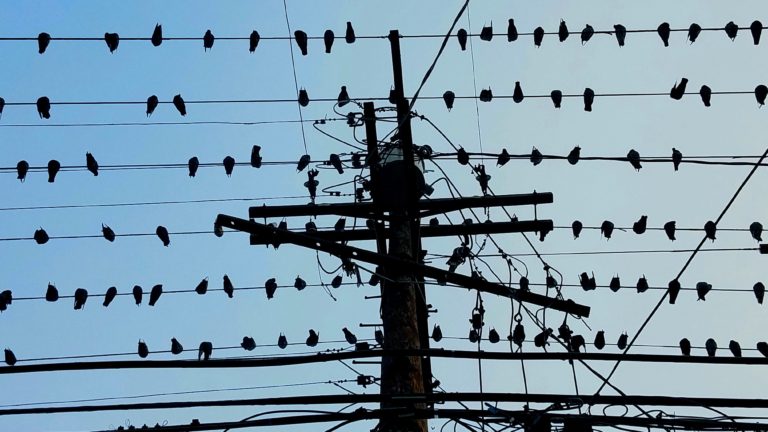Stacey Megally – Fiction

We’re Grown Adults
I’ve just come back from a six-mile run when I get Myung-Hee’s text.
LA Phil is premiering Shannon Baskin’s Elegy for Sincerity. Holy. Shit.
Shannon Baskin? My lips instinctively curl into a smirk. Twenty years ago, Myung-Hee and I lived on the same floor of our dorm and were introduced—involuntarily—to Shannon Baskin, a person I’ve barely thought about since we all graduated from the music conservatory.
Back then, everyone knew Shannon’s nightly routine. At 9:30 P.M., she would duck her head and extricate her six-foot frame from her boyfriend’s dorm room, which was right across from mine. She’d then close the door as if it were as fragile as snow on a sunny Spring day. If anyone was out in the hallway or in the shared lounge, Shannon would flash her luminous smile and put her finger to her lips—a silent “shh.”
I watched her one night from my peep hole, just to see if she’d perform the ritual even if no one else was around. She did. Duck. Extricate. Soft door close. Smile. Finger to lips. Silent “shh.”
“I heard she was Miss Teen USA,” a sex-obsessed freshman who lived at the end of our hall used to say of Shannon. “Which explains the creepy smile. Do you think that’s her orgasm face?”
A group of us who liked to study in the lounge would frequently get shushed twice in an evening. If we got too loud after the first reprimand, Shannon would appear again—no doubt because she’d been summoned by her boyfriend, Diego, who she’d just put to bed like a child—to remind us that we did, after all, live on the designated quiet floor.
On one of those nights, after the second reprimand, Myung-Hee and I, hyped up on caffeine and hump-day stress, tried to outdo each other with our best impressions of Shannon. Exaggerated puckers, eyeballs bulged like Boston terriers’, index fingers pressed to our mouths.
“You shush.”
“No, you shush.”
“I just changed his diaper.”
It wasn’t until Myung-Hee’s face froze, mid-pucker, that I turned around and saw Shannon, holding a glass of water. She strode past us toward Diego’s room, her eyes downward, her features arranged into a neutral expression. The rest of us gaped, our lips and limbs paralyzed by awkwardness
Had Shannon seen us? Heard us? At the time, we shrugged it off. The incident was just another briquette in the collection that fueled our mixture of scorn and amusement. Who cared what Shannon Baskin thought?
For the rest of that school year, we moved our study sessions to the snack bar downstairs. But the distance did nothing to stop our group’s running commentary on what we knew was happening outside Diego’s room. One Monday night, when all of us were knee-deep in midterm cramming, Myung-Hee had looked up from her gender studies textbook with a gleam in her eye. “Would it be more misogynistic or less misogynistic if their genders were reversed, and he was the one babying her?”
Before the freshman could make a joke about baby talk during sex, I said, “Just the fact that any babying is going on at all is gross. For God’s sake, we’re grown adults.”
I don’t remember very many specific things I said in college, but for some reason, I’ve never forgotten that phrase: We’re grown adults. Because as soon as the words had rolled off my tongue, it had occurred to me for the first time how close it really was. In just about a year, I’d be out of college and facing a future unknown.
That revelation, I’m reminded now, happened—indirectly—because of Shannon Baskin. I press my right toe against the back of my left shoe and kick it off while I read the text again. I’d lost track of both Shannon and Diego, who were only freshmen when I was a junior. Is it possible that cheesy Shannon Baskin, the only female composition major at Whitman at that time, actually became a successful composer?
The last time I remember seeing Shannon was on a balmy night at the end of my junior year. The air in my room had thickened into soup from the rare spring humidity drifting in from the open window. Just as I was about to close it, Myung-Hee stopped by on her way downstairs.
“Hold on, I’ll come, too.” I grabbed my backpack and slammed the window shut. As soon as I turned around, I found myself staring directly into Shannon’s eyes, which were wide with alarm. Her hand rested lightly on Diego’s doorknob. I’d obviously interrupted her routine—caught her between the soft door close and the radiant smile. She was so flustered, she forgot her silent “shh.” Instead, she shook her head and frowned until two sloped creases dented her forehead, then tiptoed away, her shampoo-ad waves disappearing around the corner
For a few moments, caught off guard by Shannon’s brief, unsmiling irritation, Myung-Hee and I said nothing. Was Shannon annoyed about the noise? Or because it was us? A delicate cough from Diego’s room abruptly brought us out of our unexpressed thoughts. “Let’s go.” I’d rolled my eyes. Once again, the encounter had been immediately forgotten, swallowed up by the pressures of finals and juries and upcoming summer festivals.
I doubt Myung-Hee even remembers that night now. I click on the link in her text and watch my screen reveal a photo of Shannon, now Shannon Baskin-Saunders—same pageant smile, same undulating golden mane, as if she’d stepped out of a time machine. I skim her biography. Oberlin Conservatory of Music (PhD). New England Conservatory (MM). Whitman Conservatory (BM). Her notable works include a concerto for marimba and orchestra, a one-act opera, and multiple compositions for full symphony orchestra. Her work, the biography says, has been described as “cerebral” and “blisteringly provocative,” “every phrase” apparrently “suffused with character and depth.”
A snort escapes my nostrils. Shannon Baskin, suffused with depth?
I glance at the clock. 7:15. I have forty-five minutes before I have to leave for work—for a job that suddenly seems ridiculous and vacuous and embarrassing. I send a shock-faced emoji back to Myung-Hee, followed by Elegy for Sincerity? Seems a bit…dark for a pageant girl? I toss my phone into my purse and try to ignore the envy blossoming in my chest.
#
Myung-Hee and I continue texting about Shannon throughout the work day, resurrecting the contempt we’d felt toward her back in college and trying to reconcile the girl who’d shushed us with this “cerebral” and “blisteringly provocative” composer.
Did we totally misjudge her?
It’s possible. We were sort of bitchy about her.
Of course we were. She SILENT-SHUSHED us.
Maybe Whitman sucked the happiness out of her.
The last text is mine. Like everyone else, during my last year at Whitman, I’d applied for grad schools and had even considered auditioning for a couple of professional cellist positions because those had been the only things I’d known to do next. But one afternoon, feeling bored and alone in a practice room, it suddenly occurred to me: This is it. This is what the rest of my life is going to look like. A deep exhaustion—like a dark grey cloud, fat with rain—settled over me. That summer, I moved back to my parents’ suburban house an hour away from Whitman and stayed for a year before beginning what would become a circuitous career path. Receptionist and part-time personal trainer. Project manager at an architecture firm. Account manager at an advertising agency—and finally, a brand strategist at the same agency.
My phone beeps with Myung-Hee’s response. Ha! Whitman is sort of a joy vacuum. Myung-Hee had also felt beaten down by the end of her years at Whitman, but for different reasons. She’d been a double major, keeping a full schedule of classes at both the conservatory and its affiliate university across the river. She’d stayed an extra year to finish both degrees and started playing professional gigs in town. By her last semester, she was itching to start auditioning for full-time symphony positions, but felt obligated to finish up at the school. Now, she’s a cellist with the L.A. Philharmonic—a position she’s held for years.
“I could never leave L.A.,” Myung-Hee says to me all the time. “If I did, where would I get free dinners and Asian pears?” Myung-Hee’s parents and extended family are scattered across Metropolitan Los Angeles, and as a single forty-something who rarely cooks, she happily accepts stacks of sealed, air-tight containers, stuffed to the brim with home-cooked bulgogi, rice, Sundubu jjigae, and slices of peeled pear, left over from dinner with family on the weekends.
“Michelle.” The swivel of my cubicle mate’s office chair interrupts my thoughts.
“Hey.” I look up from my phone and quickly put it down even though it’s perfectly normal to text at the office.
“You looking up something exceedingly cerebral over there?” She grins at me.
I blink at her, confused. Cerebral. Had I said something out loud about Shannon’s reviews? Still wrapped in a text-induced Whitman haze, I stare at my coworker until the furious clacking of laptop keys brings me back to the present. I’m at the office. I’m a strategist and my cubicle mate, an account manager, often teases strategists about being “exceedingly cerebral” with our behavioral theories and trend charting. I shake my head and laugh.
“The kids and I are going to Oktoberfest on Saturday. Wanna come with?” My coworker frequently asks me to join her family on outings, and while I like her husband and two girls, I’m beginning to feel like an awkward spinster and fifth wheel.
“Oh, thanks, but—” Instead of selecting from the menu of excuses that spins through my brain—including my go-to pretense of having plans with my parents, who still live fifteen minutes from my house—I hear myself saying something else entirely. “—I’m going to L.A. this weekend.”
My coworker pops her chin back and shoots her eyebrows up, shaping her expression into a perfect reflection of how I feel. “I didn’t know you were going out of town this weekend.”
“Yeah.” I blink rapidly, hoping to hide the surprise in my own eyes. “Kind of a last-minute thing.”
#
“Of course you can stay with me.” Myung-Hee is so excited, she’s almost singing. “I bet I can even sneak you into our rehearsal with the composer.” She says ‘with the composer’ in a nasal voice, laced with mockery.
“Do you think she’ll put her finger to her lips to silent-shush the orchestra during pianissimos?” I continue our all-day roast of Shannon while I scroll through available last-minute flights on my laptop.
By now, I’ve heard a million success stories about Whitman graduates. Recording contracts. Principal positions. Teaching tenures. Everything you’d expect from an elite music conservatory—ranked first, someone had pointed out to me recently, in U.S. News World & Report back in 1994 when Myung-Hee and I were accepted there. And with each success story, in addition to a nebulous pride of having been at the same school at the same time with them, having known them “way back when,” I’d felt a kind of distant goodwill toward them. The way I might think “Isn’t that nice?” toward a child who’s done something I know is a big deal for that age, but something I’ve outgrown. The gnaw of jealousy I’d harbored while I was in school has faded with every year I’ve been away from classical music. And yet, today, the familiar ache has just begun to tug at my chest. The more witty barbs I come up with, the more I can ignore it. And yet, the more gibes we exchange, the more Myung-Hee and I find ourselves balancing them with obligatory niceties to compensate for an unspoken guilt.
I decide on a round-trip ticket with one stop in Chicago, figuring the convenient flight times are worth the extra $100 and feeling distinct pleasure in knowing I can easily afford the added expense.
“How much do you think Shannon earns?” I click on the link to purchase the ticket.
“No idea.” Myung-Hee’s microwave beeps in the background.
“Composing classical music can’t offer a lot of stability.” I type in my credit card numbers.
“Hey,” Myung-Hee changes the subject. “What do you think happened to Diego?”
“I don’t know, I can’t find him anywhere.” With Myung-Hee, I’m not embarrassed to admit I’ve Googled him, checked social media and the Whitman alumni site for any information on him, but it’s as if he doesn’t exist. “Do you know who Shannon ended up marrying?”
“According to Facebook,” Myung-Hee says, “Adam Saunders is a trumpet player. Went to New England Conservatory—I guess they must have met there.” A loud clattering of dishes comes through the phone. “Of course, she’d marry a trumpet player.”
I nod as if she can see me. Trumpet players always go for either unimaginatively pretty women or prima donnas like violinists.
“Do you think she got married when she was super young, like twenty-four?” Myung-Hee’s voice is plump with disdain for conventionality, and also pulsing with the same envy I’ve been feeling all day. “Like she couldn’t go another year without having a man to baby?”
“Can you imagine getting married to someone we knew at twenty-four?” It’s something Myung-Hee and I frequently say to each other, both of us sinking into a kind of relief that we’ve remained single and a pride that we’ve evolved on our own. Most of the time, it’s a genuine feeling, but today, I can almost see a haze of green, growing like wild ivy, up and around our sentences.
“And I’m surprised she even bothered hyphenating her name. What a cop out. Either take your husband’s name or not.” Then Myung-Hee sighs and gives into guilt. “But then again, she should be able to do whatever she wants.”
“Yeah, that’s true.” Having finalized my ticket purchase, I sort through the bills in the mail pile. On top is my new auto insurance policy—the one I share with my parents.
#
“Are you and Myung-Hee excited to see your old Whitman friend?” My mom signals a left turn on our way to the airport.
“I guess. She was two years behind us, so we didn’t know her that well. I really just want to see Myung-Hee.”
My mom brakes at a red light and a silver SUV pulls up on my side. The driver beeps her horn and waves.
“It’s Fiona.” My mom eagerly rolls down my window from her side. “Fiona, how are you?”
Fiona Cheng, a family friend who’s two years younger than I, is wearing a pink tee-shirt from a local 10K race. Her hair is pulled up in a disheveled bun with soft wisps framing her clear, freckled complexion. “Crazy.” She smiles, rolls her eyes, and waves her hand toward the back of the SUV where her kids are sitting. “Gymnastics and soccer this afternoon. This—” She shakes her head. “—is how I spend my days off.”
“Kids, la?” My mom punctuates her Cantonese version of “huh?” with an empathetic shake of her head. “They’re the real bosses.”
“I know, right?” Then, as if just noticing me, Fiona says, “Hey, Michelle.”
“Hi.” I suddenly feel like I’m ten years old, waiting for my mom and her friend to finish a conversation about adult things that don’t interest me.
The light turns green and Fiona says, “Nice to see you guys.”
“Talk to you later, Fiona.” My mom grabs the steering wheel again and asks me to close the window. Feeling like a punctured bicycle tire, I press my finger down on the button.
“While you’re gone, I’ll get Dad to go look at that dripping faucet in your kitchen,” my mom says. “Oh, and when you get back, come have dinner with us. I’ll make char siu.”
Usually, the mere mention of my mom’s sweet and salty Chinese barbeque triggers my salivary glands, but today, I’m too deflated to entertain the craving. I take a deep breath and focus on the road just outside the windshield. “Maybe I should just call a plumber. Dad doesn’t need to fix the sink for me.”
“Don’t be silly.” My mom waves her hand dismissively. For the rest of the drive, I listen as my mom tells me about a neighbor who’s been remodeling. “They’re gutting everything. It’s like they won’t even recognize their home anymore.”
How many times have I ridden in the car like this? Me in the passenger seat, my mom driving. To and from school, to and from cello lessons, and now, to and from the airport and errands I’d rather not do alone. Is my mom going to cart me around for the rest of my life?
When we get to the airport, my mom insists on flashing her hazard lights and getting out to give me a hug. “What time should I pick you up on Sunday?”
I reach for my suitcase and extend the trolley handle. “Actually, I think I’m just going to take a cab or ride share. I’ll see you at dinner.”
When I enter the sliding glass doors, I know my mom is waiting for me to turn around and wave, but I keep my gaze straight ahead.
#
I go with Myung-Hee to rehearsal on the day the orchestra is finally going to meet Shannon. Since I’ve arrived in L.A., Myung-Hee and I have continued to feed the green-eyed monster between us. Tossing it increasingly juicy tidbits from our imaginations. Do you think she dumped Diego with a tender kiss on the forehead? Do you think she shushes all her kids at bedtime and then shushes her husband while they have sex in the next room? She probably picks out her husband’s clothes. Do you think that’s why she married him?
But we always come back to our guilt. We shouldn’t be so mean just because she was a little immature. Don’t start laughing when you see her. She can’t help who she is. They say the more successful you are professionally, the less successful you are personally. Neither of us acknowledges that our guilt is now barely different from our envy.
Now that the day has come—now that we’re walking up to the entrance of the hall, about to see Shannon Baskin-Saunders, whose name has been written by music critics, whose work has been reviewed in print—suddenly the jealousy we’d whipped into a froth feels like it’s collapsing, forcing us to succumb to a reality we’d never considered. I wonder if it’s just me until Myung-Hee says, “God, what if she doesn’t even remember us?” Her usual bluster sagging like a days-old balloon. I shrug and look down, not sure if that would be a good thing or a bad thing.
I immediately spot Shannon talking to the conductor and another silver-haired man. She leans in to listen more carefully and then smiles, revealing her perfect, white teeth—an unnerving contrast against her slim black pants and fuzzy dark sweater.
“Should we try to say ‘hi’ now?”
Myung-Hee squints in Shannon’s direction. “Nah, let’s wait until after rehearsal.”
Minutes later, I sink into a seat at the back of the concert hall and wait to hear an elegy composed by a rumored Miss Teen USA. Actually, Myung-Hee had begrudged last night when I’d arrived, it’s pretty good.
Five minutes later, I have to agree. The motif is plaintive, but not overwrought, and tinged with wistfulness. But sitting in on an orchestral rehearsal fills me with a vague sort of dread as if I’m back at Whitman, a senior with no plan. Shame snakes through my chest, moving in time with the E-flat minor bassline. And for a moment, I’m twenty-one again, weary and dissatisfied, grasping for something to make me feel less lost. Like the game of “at least.” At least I don’t suck as bad as so-and-so. At least I make better grades in my academic courses than so-and-so. At least I don’t have to figure out a student visa like so-and-so.
At least—the notion unravels as if it’s been waiting to be released for days—I’m more grown up than Shannon Baskin.
As if she’s heard my thought, Shannon looks out into the auditorium and locks eyes with me. Calm, distant like a stranger. I’m jolted back to L.A., to 2019. But in a fraction of a second, she turns back toward the orchestra and starts talking about a meter change. Maybe she hadn’t looked right at me. Or maybe her eyes had just landed on me randomly while she gathered her thoughts.
For the next twenty minutes, I observe Shannon. She listens with focus and intent. When she gives feedback, it’s assured and articulate, sometimes even stern. And if she notices the smirks on a few of the faces in the orchestra—mostly older men—she doesn’t react. She carries on the way I try to—and often fail to—when I’m reckoning with overconfident men at my office. And not once during the twenty minutes does she smile like a pageant girl.
Most of the players, including Myung-Hee, look interested, curious. The more they hang on Shannon’s every word, the more I wait for her to slip. To use a word incorrectly, to patronize the conductor, or to actually lose her footing and topple over in her modest heels.
She doesn’t.
#
We don’t see Shannon after rehearsal—she’s whisked away long before it ends. So we try to catch up with her at the post-premier reception, held in Shannon’s honor, the following night. Myung-Hee and I nurse flutes of sugary champagne. Goosebumps attack my bare arms until I’m shivering—air conditioning, or maybe nerves. We wait until the administrators and benefactors and older patrons and young composer types have all left. Until Shannon, her hair twisted elegantly at the nape of her neck, stands by herself.
Before either of us can say anything, Shannon spots us approaching, her eyes searching our faces. “I know you guys.” She takes in Myung-Hee’s concert black and cello case. “I thought you looked familiar. Can you believe it’s been so long? How are you?”
Tiny lines mark the corners of her eyes and the sloped creases are now embedded in her forehead. I’m not sure why I never noticed her irises before—the color of the chocolat chaud I’d had at Carette on Place des Vosges last year. And when she turns to me, a quiet recognition settles into them. “Hi.” She smiles. White. Luminous. I wait to feel scorn, I wait to feel amusement. But today, it feels like sun on an early May morning.
Ten minutes later, we watch Shannon Baskin-Saunders leave with her husband, who had been kind and interested in us, and her two children, both very blonde and very serious. Myung-Hee and I stand side-by-side and I wonder if Myung-Hee has the same feeling I do—of standing in a Whitman practice room, staring out onto the streets in springtime and marveling at how just a week earlier, those same roads and trees and roofs had been covered in layers of snow and slush.
“Did we really just ask if we could take a selfie with her?”
“We’re basically sixteen.”
As we walk silently toward the exit, the taste of champagne lingers on my tongue. I open the door for Myung-Hee and watch while she drags her cello case through it. Did Shannon Baskin-Saunders ever call me by name tonight? I’m almost certain she did, but I can’t remember hearing her say it. Did she even really know who I was? I step outside. The evening air warms my arms and the question drifts away and disappears into the night.



